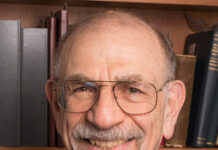
Rabbi Tyler Dratch
Parshat Korach includes the most satisfying account of divine justice in the entire Torah. Korach assembles a group of 250 leaders who rise up in protest against Moses. “You have gone too far!” asserts Korach, arguing that Moses has made himself a leader over the people, despite the fact that the entire community has been designated as holy before God. Moses invites Korach to set out firepan offerings, suggesting that God will determine if their argument is truly just. The next morning, when Korach comes to make his offering, the earth suddenly fractures and swallows those who have come to protest.
Is this not the way that many of us wish our deepest arguments might be resolved? That God would intervene and tell us whose claims are just and whose should be devoured by the earth? This has become more timely, as our community becomes more politically diverse and our civic discourse more fractured than ever before.
The story of Korach can be described as a “political fantasy.” Yes, God will side with those who are righteous, but we know that diversity of opinion and struggle over leadership will continue among the Israelites. Just look at nearly every following book of the Tanakh. Sectarian disagreement still exists to this day within the Jewish community.
What might we do in this moment, when we cannot rely on divine intervention to solve our own disagreements? Activists around the country have, over the last decade, started experimenting with a tactic called “deep canvassing.” Unlike usual political campaigns, where organizers speak only to people who agree with them to increase participation, in deep canvassing, activists engage people with whom they deeply disagree. Canvassers share personal stories about their own connection to an issue and ask others to do the same. Activists do not moderate their positions in these conversations, but rather try to display empathy for the other and find some connection on shared underlying values. In some cases, they are able to change some minds when they have engaged in this respectful way. In other cases, they are paving the way for a more civil public discourse when future disagreements arise.
What would it look like to commit to engagement in the spirit of deep canvassing? Perhaps Korach and Moses deep down both wanted what was best for the Israelites. Perhaps there were true connections between the two leaders forever undiscovered.
Rabbi Tyler Dratch is the rabbi for tefilah leadership and the director of youth and family education at Beth Am Synagogue in the Reservoir Hill neighborhood of Baltimore.





